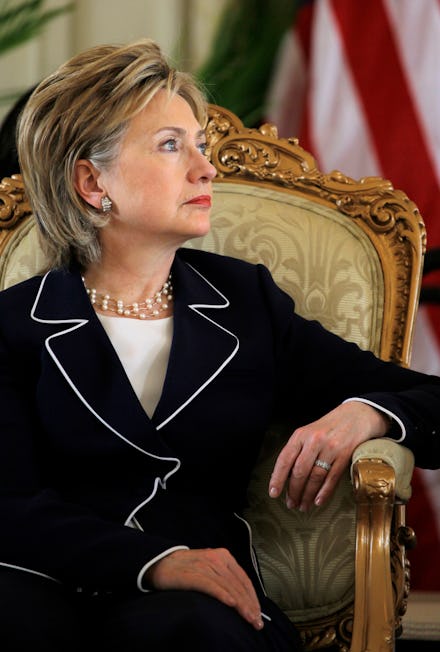The Real Reason We Haven't Yet Had a Female President

I wanted to be president when I grew up. Adults teased me that there were no women presidents, but I'd just defiantly insist that then I'd be the first.
As I grew older, and more cognizant of the struggles minority women face in politics, my interest in playing any kind of role in government waned. I joked that I was a triple whammy: a woman, a minority, and a Muslim.
There was no place in politics for people like me.
In her documentary Miss Representation, Jennifer Newsom describes how women are discouraged from taking leadership roles from an early age. When she was pregnant with her son, people said that her boy would be a future president.
No one said that about her daughter.
While women make up half the American population, they comprise less than 20% of Congress. Only 36 women have served as governors in the United States, and just five women serve today.
The numbers for minority women are even more abysmal: they represent less than 6% of Congress today. Only two minority women have ever served as governor: Nikki Hayley of South Carolina and Susana Martinez of New Mexico.
Sadly, the public does not view this disparity as a cause for alarm. A recent survey by ABC News-Fusion showed that only 43% of Americans believed that it would be a good thing if more women were elected to Congress. There was also a large gap between the political parties: a scant 23% of Republicans agreed with the survey question, compared to 60% of Democrats.
However, more women in Congress would undoubtedly be a good thing, because legislation would start to address the needs of more Americans. Research shows that even if women don’t prioritize women's issues, they are more active on women's rights legislation than men. Similarly, studies suggest that African American and Latina women champion agendas focusing on both women and people of color. The increased presence of minority women in Congress would provide a voice for these marginalized communities.
In order to increase the representation of women in politics, we must build a more welcoming political culture. Women are just as likely as men to win campaigns; the problem is that they're far less likely to even get to that point. Women are less confident that they are capable of serving. As Ayanna Pressley, a Boston City Council member told The Root, "We are not set up with the same sense of entitlement. Which is why a 19-year-old white male will challenge an incumbent and a woman of color who is the VP of a company, who serves on nine boards, has two advanced degrees, and raised four children will say no. We never think we're ready. We never think we're good enough."
This is why the National Republican Congressional Committee's Project GROW, and the Democratic National Committee's Democratic Women's Alliance, designed to recruit and train female candidates, are steps in the right direction. Programs like these have existed in the past, such as the Women's Campaign School at Yale, but this is the first major initiative on behalf of the political parties.
When I was born, my aunt and uncle sent my parents a card from India congratulating them on their new daughter. The card announced that girls could grow up to be anything — doctors, engineers, and even prime ministers. I only saw that card recently, as a 21-year old, but it reminded me that I was capable of achieving anything I set my mind to. All women should feel the same.